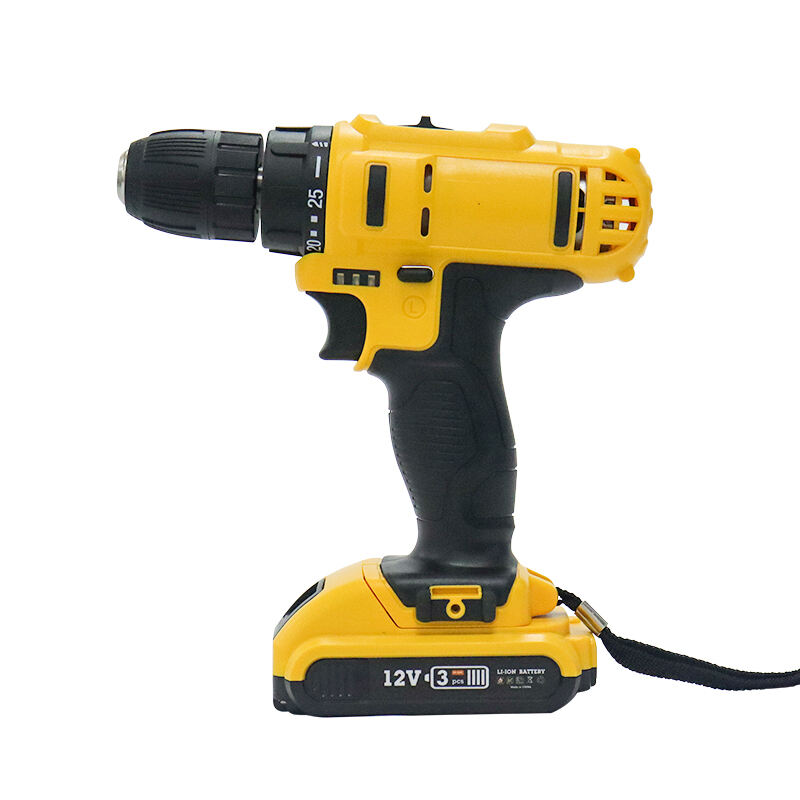Introduction
An electric cordless drill is a versatile and indispensable tool in any toolbox, whether you're a professional contractor or a weekend DIY enthusiast. With a wide array of options available, selecting the right cordless drill can be a challenging task. This article will guide you through the essential features, types, and considerations to help you make an informed decision when purchasing an electric cordless drill.
Key Features to Consider
Battery Technology
The battery is the heart of a cordless drill. Lithium-ion (Li-ion) batteries are now the industry standard, offering longer runtimes, lighter weight, and no memory effect compared to older Nickel-cadmium (NiCad) batteries. When considering a drill, look for one with a battery that offers a good balance of capacity and charging time.
Power and Performance
The power of a cordless drill is typically measured in watts or volts, with higher numbers indicating greater power. Torque, measured in Newton-meters, is another critical factor, as it determines the drill's ability to grip and turn screws or drill bits. Ensure the drill you choose has adequate power and torque for your intended tasks.
Speed Range and Settings
Variable speed control allows you to adjust the drill's speed for different tasks. High speeds are ideal for drilling into soft materials, while low speeds provide more control and power for harder materials or when driving screws. Look for a drill with a wide speed range and adjustable settings.
Chuck Type and Size
The chuck is the part of the drill that holds the bit. Keyless chucks are quick and easy to use, while keyed chucks may offer more precision. Consider the bit capacity and the type of chuck when choosing a drill.
Ergonomics and Design
A comfortable grip, well-balanced design, and lightweight construction can make a significant difference in user comfort and precision, especially during extended use. Ergonomics should be a priority when selecting a cordless drill.
Additional Features
Modern cordless drills come with features like LED work lights to illuminate your work area, battery indicators to show remaining charge, and a reverse function for easy screw removal. Brushless motors are also becoming more common, offering increased efficiency and longer service life.
Types of Cordless Drills
Standard Cordless Drills
These are versatile tools suitable for a wide range of tasks. They offer a good balance of power, speed, and torque, making them ideal for both DIY and professional use.
Impact Drivers
Impact drivers are designed for high-torque applications and are often used for driving screws and bolts. They offer a higher level of torque than standard drills and are particularly useful for heavy-duty tasks.
Hammer Drills
Hammer drills incorporate a hammering mechanism that delivers additional force, making them ideal for drilling into masonry, concrete, and other hard materials.
Right Angle Drills
These drills are designed to operate in tight spaces where a standard drill would not fit. They can be gear-driven or motor-driven, with the latter offering more power and precision.
Brand Reputation and Model Comparisons
When considering a cordless drill, it's essential to look at the brand reputation and compare different models. Top brands like DeWalt, Makita, Bosch, and Milwaukee offer a range of models with varying features and performance capabilities. Customer reviews and ratings can provide valuable insights into the real-world performance and reliability of each model.
Budget and Value for Money
The cost of a cordless drill can vary widely, from affordable options for occasional use to high-end models for professional applications. Consider your budget and the value you're getting for your money. A more expensive drill may offer better performance, durability, and longer battery life, which can be worth the investment in the long run.
Usage and Intended Purpose
Consider how you plan to use the drill and the types of materials you'll be working with. If you're a professional or plan to use the drill frequently, you may want to invest in a more robust model. For lighter, occasional use, a more affordable option may suffice.
Compatibility and Accessories
Check if the cordless drill is compatible with other tools in a kit or system, which can be beneficial if you plan to expand your toolkit in the future. Also, consider the availability of additional accessories and bits, as these can enhance the drill's functionality.
Maintenance and Durability
A good cordless drill should be easy to maintain and built to last. Look for a drill with a durable construction and consider the longevity of the battery and the ease of replacing it when necessary.
Conclusion
When buying an electric cordless drill, consider the battery technology, power and performance, speed range, chuck type, ergonomics, and additional features. Also, take into account the type of drill, brand reputation, budget, intended usage, compatibility, and maintenance requirements. By keeping these factors in mind, you can select the best cordless drill for your needs and ensure a tool that will serve you well for years to come.

